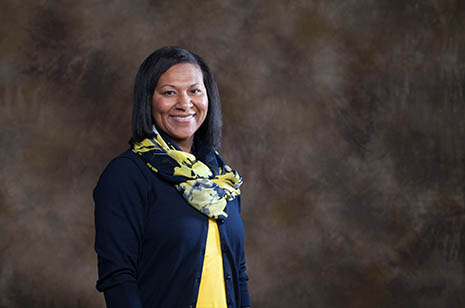FAYETTEVILLE, Ark. – A new book edited by a University of Arkansas professor describes the involvement of families as crucial when counseling people with addictions.
Stephanie Lusk, a University of Arkansas assistant professor of rehabilitation education and research, edited the forthcoming textbook Counseling the Addicted Family: Implications for Practitioners and authored or co-authored six chapters of the book. It emphasizes the importance of incorporating the families of people diagnosed with substance use disorders into the counseling process.
“Oftentimes, we treat addictions looking solely at the individual,” Lusk said. “It’s very important to realize that addiction is not an individual disease. It affects the entire family system and incorporating families into the treatment process is imperative.”
In some ways, Lusk’s textbook is the first of its kind.
“I taught a marriage and family addiction counseling course at North Carolina AT&T State University for six years and there was not a textbook that I felt did the subject justice,” she said. “There were only two or three other textbooks that dealt with counseling addicted families, but they were not comprehensive.”
The textbook focuses on the interplay between people with substance use disorders and their families. Lusk’s first chapter deals with individual and family development. The second chapter moves to a discussion of how dysfunctional families develop and contrasts characteristics of healthy and unhealthy families.
“With unhealthy or addicted families, communication totally breaks down. If you can’t communicate, you can’t solve problems, and you can’t make decisions about what needs to be done or effectively solve problems,” Lusk said. “Healthy families allow room for autonomy, for the individuals to be themselves but also be a part of that family system. In both healthy and dysfunctional families, individuals take on roles, but in dysfunctional families these roles are not healthy and further perpetuate problems associated with the addiction.”
She said that it is the responsibility of the counselor to assist the family in overcoming this breakdown in communication and rebalance the roles within addicted family systems. An important part of this process is getting families in the door.
“A lot of times, family members don’t get to tell their stories,” Lusk said. “If you’re working with the addicted individual, you hear everything from their perspective and a lot of times that’s tainted, it’s jaded, it’s coming from an individual who has been under the influence of alcohol or drugs for years. So, I think that getting the family in and letting them tell their story is really important in helping the family to heal.”
It’s also important that counselors and physicians take the necessary steps to properly diagnose individuals with substance use disorders. Behavior of individuals under the influence of drugs or alcohol can mimic symptoms of regularly co-occurring disorders such as mood disorders, anxiety disorders, personality disorders and psychotic disorders. It becomes necessary, then, to ensure that the individual’s system is clean before making a diagnosis.
“You definitely do not want to diagnose someone with a disorder they don’t have, but you also want to make sure that if there is something else, such as a co-occurring mood or anxiety disorder, that it’s been appropriately diagnosed so that you can develop an appropriate treatment plan for them,” Lusk said.
Other chapters in the book deal with specific counseling therapies and how they could be applied specifically to addictions counseling; non-traditional addictions, ones in which addictions are co-occurring; media and technology addictions; unique challenges of addicted women; fatherhood as it is related to healthy families, preventing addiction, and the recovery process; research on the effects of employment and unemployment on the addiction therapy process and more.
Lusk is an assistant professor of rehabilitation education and research in the department of rehabilitation, human resources and communication disorders in the College of Education and Health Professions. She co-wrote one chapter of the book, “The Rationale for Family Therapy in Addictions” with Chinwendu Okoronkwo, a U of A graduate assistant.
Topics
Contacts
Stephanie Lusk, assistant professor of rehabilitation education an
College of Education and Health Professions
479-575-4817, sluskhe@uark.edu
Hillary Scott, intern
University Relations
479-575-5555, hescott@uark.edu
Heidi Wells, content writer and strategist
Global Campus
479-879-8760,
heidiw@uark.edu
